Columbia's Agreement with Federal Government Sparks Divided Reactions
A recent agreement between Columbia University and federal officials after lengthy negotiations has drawn mixed responses from faculty, students, and alumni—highlighting ongoing divisions on campus since the start of the conflict in Gaza.
David Pozen, a professor at Columbia Law School, criticized the deal, calling it a way to give "legal form to an extortion scheme."
"The methods used to enforce these changes are as unprecedented as they are flawed. U.S. higher education policy is now being shaped through irregular agreements, a process that undermines both the university's role as a space for independent thought and the integrity of legal governance," Pozen added.
Others at Columbia viewed the settlement more favorably. The Stand Columbia Society, a coalition of alumni, students, and faculty, endorsed the decision, noting that they had long supported reforms aligned with the government's demands.
"The Stand Columbia Society sees this agreement as a positive resolution that secures research funding, advances necessary changes, and upholds academic independence," they stated. "We have remained firm in advocating for what is right, and today, both the university and government officials should be acknowledged for reaching this outcome."
The federal government's broader effort to impose financial penalties on universities follows its recent agreement with Columbia. According to sources, this deal is seen as setting expectations for future negotiations with other institutions.
Under the terms of the settlement, Columbia will pay $200 million to the government over three years, along with an additional $21 million to resolve related investigations.
"This agreement represents progress after a challenging period of federal review and uncertainty," said Claire Shipman, the university's interim president.
Funding was initially withheld over allegations that Columbia did not adequately address reports of antisemitism on campus following the outbreak of the war in 2023.
Federal officials are now reportedly pursuing similar actions against other universities, including Harvard, accusing them of failing to combat antisemitism on campus as a condition for restoring federal funding.
Read next

"Widow to forfeit half of pension scam compensation to taxes"
The relatives of a man who lost his retirement savings after becoming entangled in the Norton Motorcycles pension scheme fraud are set to forfeit nearly half of their compensation due to an obscure tax regulation.
After a prolonged effort to secure payment from the Fraud Compensation Fund (FCF), Robert Dewar’

"Has Kemi Badenoch Ended One Nation Conservatism?"
In one interpretation of the Conservative Party's electoral successes, its last three victorious leaders—John Major, David Cameron, and Boris Johnson—each entered Downing Street promoting unity and broad-based principles.
However, this year's gathering of Conservative members has been defined by tougher language on asylum policies

Zarah Sultana and Corbyn reconcile, poised to co-lead new party
Zarah Sultana and Jeremy Corbyn Reconcile Ahead of New Political Group Launch
Zarah Sultana has stated that she and Jeremy Corbyn have resolved tensions in their joint leadership of a new political initiative, comparing their dynamic to that of the Gallagher brothers from Oasis.
Speaking alongside Corbyn at the *World

